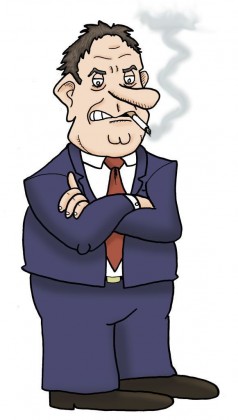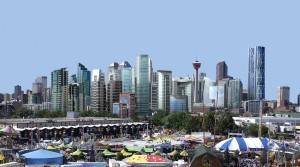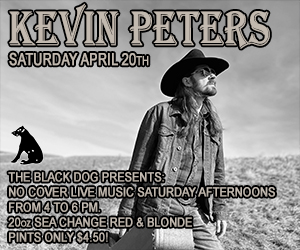King Ralph had it in for Edmonton – for our own good!
Posted on April 8, 2013 By Gene Kosowan Culture, Front Slider, News, news, Politics
I only met Ralph Klein once, back in 1992, before he was on the verge of grabbing the Conservative leadership title away from Tory Golden Girl Nancy Betkowski. It was a wintery night at the K-97-CJCA radio studios, where I was working late as a special projects coordinator for K-97, and as I left through the rear door, Klein was puffing on a butt with CJCA’s Rush Limbaugh wannabe Peter Weissbach and his entourage of yes-men. Bidding them a pleasant “Good night, gentlemen,” I was greeted with a gruff “Mmmph” from Klein and his loutish legion – an ominous sign that perhaps I didn’t quite fit his idea of “severely normal.”
Or maybe he was just having a bad night.
Our paths never did cross again, but during much of King Ralph’s Fiscal Reign, his actions had a profound effect on my life: The loss of my teaching job a year after he officially became Premier once his five per-cent rollbacks rendered me surplus, the loss of my mother’s life as she lay waiting in an emergency room for what limited healthcare resources could do to revive her, the loss of countless friends who fled the province in the wake of his purge on the arts community.
The first two painful anecdotes are far too close to home to warrant an objective treatment from this end. But upon reflection after the final eulogies have finally been sucked out of Calgary’s Jack Singer Hall via its palatial air conditioning system, I’ve had some time to reassess the perceived damage he inflicted on the province’s arts sector. Conclusion? He really took artist’s concerns to heart; all we had to do was read through the rhetoric to get to the gist of his good intentions.
It’s now safe to say that the arts scene’s unmitigated disaster – scathingly chronicled in Liz Nicholls’ recent Edmonton Journal article The Klein Era legacy in culture: don’t make us laugh, which has gone viral – lamented of late in post-Klein rebuttals actually had an element of understated benevolence. And although the profile of the cultural sector plummeted faster than St. Louis Hotel suds down a redneck’s esophagus, Klein was actually doing disenfranchised dalliers a huge favour.
To filmmakers affected by the demise of the Alberta Motion Picture Development Corporation in 1996, Klein encouraged them to forego the risks of producing zero-audience potential indie outings in a sub-zero climate and try their hands at more lucrative projects in much more temperate locations as Vancouver and Toronto. Why work on a low-budget short that may get marginal attention at a low-budget film festival when opportunities to work on the set of “The X-Files” and rub shoulder with the likes of David Duchovny would yield higher rewards? Ditch the winter woolies and whip out the sun-block!
Ditto for actors, artistic directors and playwrights dealing with cuts in the Alberta Foundation for the Arts, which in turn boosted employment opportunities in Alberta’s hospitality industry. Once the thespians fled Wild Rose Country for sunnier climes, restaurants immediately posted “Help Wanted” signs in their storefront windows. That is what we call foresight.
As for the music community, Klein will forever be seen as a hipster before hipsters were cool. Slashing funding for recording, touring and other amenities was his way of upholding the DIY “do-it-yourself” ethic that gave rise to the punk movement which pulverized mainstream circles more than a decade before Klein’s rise to provincial prominence. Klein taking a page out of Joey Shithead’s street-smart manual for alternative upstarts is an act to be admired, not chastised.
While Klein may have been vilified for his apparent disdain for the arts, detractors have been way off-base in how they perceived his attitude towards Edmonton. One remark he made to CTV bureau chief Craig Oliver some time ago is especially poignant, when he declared, “The best part about Edmonton was the flight to Calgary.” He’s right. I remember one departure to Toronto via Stampede City rendered me fortunate to get a window seat. The view of E-town jutting over the ice and muck-covered prairie desolation is absolutely breathtaking.
He could easily be forgiven for his remark that “Edmonton isn’t really the end of the world – although you can see it from there.” What he was really doing was urging on more urban development in the provincial capital. Now that the City Centre Airport is kaput, which was the only impediment to building taller skyscrapers in the downtown core, it’s only a matter of time before Edmonton creates a structure high enough that from the penthouse, one could see the end of the world – which is roughly 300 km South.
Which brings me back to my sole encounter with King Ralph when he was mere days away from nabbing the Tory crown. Perhaps I was totally wrong about the man and the tender heart that beat beneath a roughneck surface. As our current Premier Alison Redford eulogized recently, “Ralph Klein’s ability to connect with Albertans from all walks of life was absolutely remarkable. He could walk from the Petroleum Club in downtown Calgary to the curling rink in St. Paul and carry on a conversation with absolutely everyone he met. Ralph was a real man of the people.”
Perhaps his grunt was his way of greeting me and indicating that he was indeed a man of the people – albeit mostly those who answered to Martha and Henry. Perhaps it may have been his way of inviting me to quaff a few pops after hours. But I’ll never know. I’ve never been fluent in Klein-Speak.
Gene Kosowan is a freelance journalist, publicist and musician based in Edmonton. During the Klein Revolution, Gene earned the distinction of being the only person to have ever occupied the managing editor post as both SEE magazine and Vue Weekly. Thanks, Ralph!















